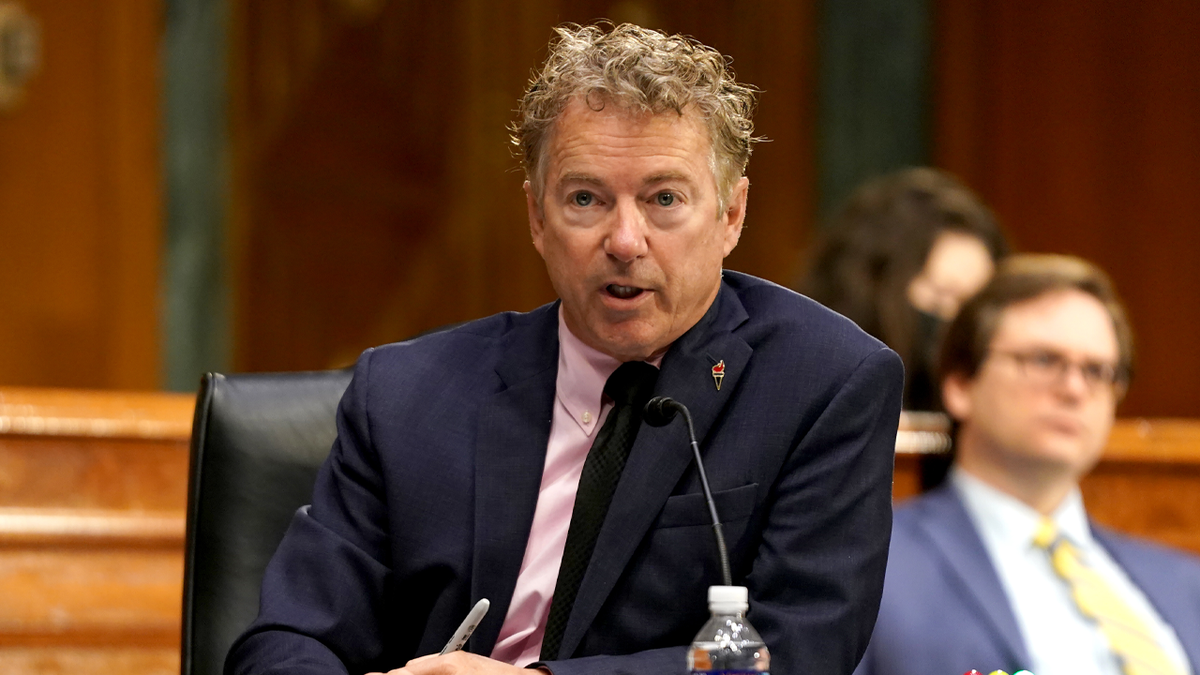Fox News Flash top headlines for December 8
Fox News Flash top headlines are here. Check out what's clicking on Foxnews.com.
The proponents of antitrust laws are famously zealous in their desire to eradicate "the curse of bigness." To them, big is always bad. Except, of course, when it comes to the size and scope of government.
These antitrust activists tried to rush legislation through the Senate that would give government more power over the economy. The Merger Filing Fee Modernization Act wouldn’t just give government more power, it would also be bad for consumers.
HERE'S WHY A 51-49 MARGIN IN THE SENATE IS HUGE FOR THE DEMOCRATS
The same people who supposedly fear the concentration of power in the marketplace celebrate the concentration of power in a state that inserts itself into and nullifies private contracts, breaks up companies it deems too large, and inflicts punishment on those that succeed in the competition for consumers.

Sen. Rand Paul (R-KY) stopped big government's latest power grab. (Greg Nash-Pool/Getty Images)
In short, antitrust seeks to cap the amount of success any business can enjoy and the benefits reaped by customers.
As the economist Yale Brozen wrote, antitrust law "seems to say that firms should compete but should not win. Firms should be efficient enough to survive but … should not share the fruits of that greater efficiency with their customers."
And that is the fatal defect of antitrust policy. Antitrust fails to accept the lessons of economic history: that voluntary exchange is a win-win proposition and that consumers are incredibly powerful in a free-enterprise system.
A company that continuously rewards its customers with superior products and innovations will, in turn, be rewarded with a greater market share than its competitors.
In 2005, when Netflix was already several years old and growing in popularity, the FTC busied itself by blocking a merger between Blockbuster and Hollywood Video, two companies that no longer exist. And Netflix continued to grow. It grew so successfully that only a few years ago some thought Netflix was becoming a monopoly.
But no company can achieve a strong position in the market and rest on its laurels. Consumers are too demanding, and competitors will arise to steal customers away from any firm that ceases to treat its clients well.
Unlike players in the marketplace, who must take note of consumer trends to survive, antitrust enforcers often fail to see what is in front of their faces.
Just take the issue of video services. In 2005, when Netflix was already several years old and growing in popularity, the FTC busied itself by blocking a merger between Blockbuster and Hollywood Video, two companies that no longer exist.
And Netflix continued to grow. It grew so successfully that only a few years ago some thought Netflix was becoming a monopoly.
No such fear exists today as Netflix competes with Hulu, Peacock, Amazon Prime Video, Disney Plus, HBO Max, Apple TV, Paramount Plus and others.
We didn’t need government to break up Netflix. We didn’t need government to intervene to ensure competition and innovation. All we needed to do was to let the market work.
But standing in the way of the benefits of the market are the antitrust zealots.
The U.S. Chamber of Commerce pointed out that enacting the Merger Filing Fee Modernization Act into law would "stymie legitimate business transactions across sectors and industries, create needless new bureaucracy, and spur unwarranted litigation."

Antitrust zealots once stopped a video store merger, meanwhile streaming services now dominate the market. (iStock)
But the bill is even more nefarious than that. It will take money out of the productive sector of the economy and give it to bureaucrats in Washington.
As Americans for Tax Reform correctly points out, this legislation "would give the Biden Administration hundreds of millions in new funds to pursue a progressive social agenda."
This legislation is just the first step to reinvigorate antitrust law.
CLICK HERE TO GET THE OPINION NEWSLETTER
There is no lack of bills designed to empower government control of the marketplace.
The same people who supposedly fear the concentration of power in the marketplace celebrate the concentration of power in a state that inserts itself into and nullifies private contracts, breaks up companies it deems too large, and inflicts punishment on those that succeed in the competition for consumers.
Take just one bill called the Competition and Antitrust Law Enforcement Reform Act, which would presume that any merger of a certain size violates the law and shifts the burden of proof to the merging parties to demonstrate that the merger is legal.
According to Robert Bork Jr., the president of the Antitrust Education Project, that bill "would enact so many potential ways to prosecute, abuse, and torment companies that government would, in essence, become the real board of directors of every major company in America."
CLICK HERE TO GET THE FOX NEWS APP
That is what is coming. The antitrust legislation we in the Senate considered this week is a mere precursor to designating the Department of Justice and Federal Trade Commission as the central planners of the American economy.
It seeks to take the power out of the hands of consumers and hand it to antitrust bureaucrats, and that’s why I went to the floor and made my objection to this bill clearly known.











































